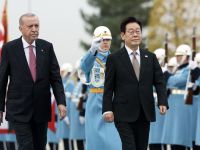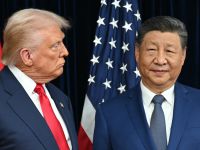Protestors set alight buildings in the hometown of Irian Jaya independence leader Theys Hiyo Eluay, whose body was found Sunday after he was abducted, an activist said.
Aloysius Renwarin, the deputy director of the human rights group Elsham, told AFP from Jayapura, that locals, angered by the discovery of Eluay's body torched several buildings in Eluay's hometown, Sentani, some 55 kilometers (34 miles) to the west of the provincial capital.
"We have received report that at least three shops and three other buildings have been torched but that the violence had now subsided and the security personnel have the situation under control," Renwarin said.
Antara news agency said that many shops had closed in Jayapura, fearing unrest, while the city's public minibuses also disappeared from the streets.
Eluay's body was found in his car which was lodged against a tree at the top of a ravine in Koya, some nine kilometres from the border between the Indonesian province and Papua New Guinea, Renwarin said.
Doctors at the general hospital in Jayapura spent more than four hours conducting an autopsy on the body.
"The results of the autopsy have not yet been conveyed to us," said Eluay's defense lawyer Anum Siregar from the morgue. Hundreds of people were also awaiting the results outside the morgue, she added.
Anum also said it was unlikely that the funeral would take place Monday. Eluay's supporters have said they planned to march with his body from Jayapura to bury him in Sentani.
Eluay, who chaired the pro-independence Papua Praesidium, went missing after unidentified men, said to be non-Irianese, stopped his car late on Saturday evening halfway between Jayapura and Sentani.
Pictures apparently of Eluay's corpse show his body was bruised, his face darkened and his tongue sticking out, indicating possible strangulation.
Eluay and four other members of the pro-independence Papua Presidium -- Don Flassy, John Mabror, Reverend Herman Awom and Thaha Al-Hamid -- have been on trial in Jayapura on charges of subversion for demanding independence for Irian Jaya, known locally as Papua.
The independence leader and his colleagues were arrested and charged around last year's December 1 anniversary of a declaration of Papuan independence. They were released from detention, pending trial, in March.
Eluay had already left detention for emergency prostate surgery in Jakarta, where he spent about two months in hospital, with the bills paid by then Indonesian president Abdurrahman Wahid.
Irian Jaya is Indonesia's easternmost province, lying on the western half of New Guinea island. Local resentment has simmered over the central government's exploitation of its rich oil, gas and mineral reserves.
Anger has also been fostered by the resettlement in the province of huge numbers of Javanese, and by the occasional brutality of security forces.
Independence supporters, including Eluay's Papua Presidium, maintain that a 1969 UN-sponsored plebiscite, that reaffirmed Indonesian sovereignty over the former Dutch territory, was flawed and unrepresentative.
Eluay and the presidium have also rejected a broad special autonomy passed by the Indonesian parliament in October in efforts to head off pressure for independence. Officials have said President Megawati Sukarnoputri might come to Jayapura on the day the new autonomy law takes effect on December 22.
Under the special autonomy Irian Jaya will be renamed Papua and greater recognition given to the special characteristics of the mainly Melanesian-populated province by allowing it to have its own flag and anthem.
Seventy percent of revenues from natural resources will be returned to the province while the rest will go to Jakarta. Papua will also receive an annual six trillion rupiah (600 million dollars) from the central government.
The bill also provides for a Papua People's Council to protect the rights of the indigenous inhabitants -- JAKARTA (AFP)
© 2001 Al Bawaba (www.albawaba.com)







